The Japan national cricket team is the team that represents the country of Japan in international cricket matches. They have been an associate member of the International Cricket Council since 2005, having previously been an affiliate member since 1989. They are currently ranked at equal 37th in the world and at fourth amongst non-test teams in their region.
Cricket was first played in Japan in 1868 when a group of English merchants living in Yokohama founded the Yokohama Cricket Club, playing their matches on what eventually became the Yokohama Stadium. The club, now renamed as the Yokohama Country & Athletic Club, still plays cricket today.
Cricket did not become organised until the 1980s, when the Japan Cricket Association was formed. They became an affiliate member of the ICC in 1989, and the national team first played in the 1996 ACC Trophy, losing all their games including a 380 run defeat by Fiji. They continued without success in the 1998 tournament and the 2000 tournament.
After the 2000 ACC Trophy, they left the Asian Cricket Council and became part of the ICC's East Asia/Pacific region. They played in the East Asia Eights tournament in Australia in February 2002, finishing as runners up to an Australian indigenous team. Indonesia and South Korea were the other teams in the tournament. In 2004, they hosted the East Asia Pacific Cricket Challenge tournament as part of qualification for the 2007 World Cup, finishing third after beating Indonesia in a play-off.
In June 2005, Japan were promoted to associate membership of the ICC and that year they played in the 2005 ICC EAP Cricket Cup in Vanuatu, winning the tournament after beating the Cook Islands in the final. The following year they played in the 2006 ICC EAP Cricket Trophy in Brisbane finishing last in the three team tournament that also involved Fiji and the Cook Islands.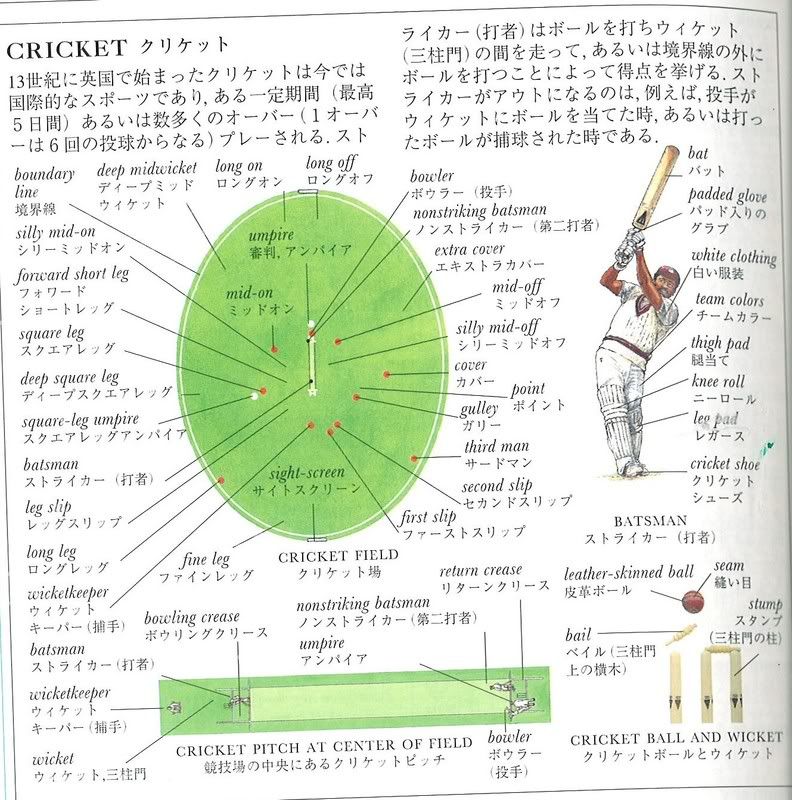

Wednesday, July 9, 2008
In the International Spotlight...Japan Cricket
This is Borat learning how to play cricket!
Thought you guys may be interested to see the infamous Borat (that funny Kazahkstani guy acted out by Sacha Cohen) trying to play cricket, hope you enjoy the hilarity of it :)
Player Profile(#28)...Graeme Smith (South Africa )
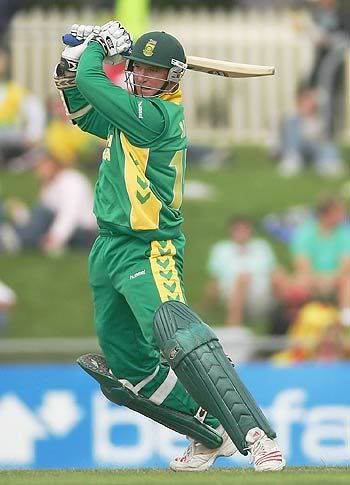
Graeme Craig Smith (born 1 February 1981 in Johannesburg) is a South African cricketer, and the current captain of the South African cricket team, having succeeded Shaun Pollock after the 2003 Cricket World Cup.
A tall and attacking left-handed opening batsman, on the 2003 South African tour of England he made double centuries in consecutive Test matches: 277 at Edgbaston, and 259 at Lord's. The 277 is the highest individual innings ever made for South Africa, and the 259 is the highest score ever made at Lord's by a foreign player.
Known for the success of his opening partnership with Herschelle Gibbs, South Africa's most prolific ever opening partnership, Smith has the distinction of having been part of all four of South Africa's opening partnerships of over 300 runs: in three of them he was partnered by Gibbs, and in 2008 Smith added 415 for the first wicket with Neil McKenzie against Bangladesh, a world record opening partnership.
Born and raised in Johannesburg, Smith was educated at King Edward VII School.
Smith played three Under-19s tests and seven one day internationals for South Africa Under-19s, of which five were during the Under 19 Cricket World Cup. He scored one fifty in the test matches, but scored five half centuries in the one dayers. Smith was also awarded the South African Cricketer of the Year award for his performances in the 2001–02 South Africian cricket season.
Graeme Smith has played for a number of cricket teams in South Africa. He currently plays for Western Province cricket team but due to his international commitments, his appearances for them have been limited, his last game for them being on October 28, 2004. In total he has played 17 games for Western Province scoring 1,312 runs with four centuries at an average of 46.85. He has also played for other teams in South Africa including United Cricket Board of South Africa Invitation XI and Western Province Boland.
He has also played county cricket for Somerset in the 2005 English cricket season, captaining the club for part of the 2005 season, and he scored a century in a tour match against the Australians in preparation for the 2005 Ashes series. Against Leicestershire at Taunton he scored his maiden first-class triple hundred (311 off 255 balls). He also hit 105 in the Twenty20 Cup match against Northamptonshire, which is currently the 11th highest score in the domestic Twenty20 Cup competition. Smith also captained the team to victory on finals day to secure the Twenty20 Cup trophy, making 64 not out from 47 balls in the final.
In 2008 Graeme Smith played in the inaugural Indian Premier League for Rajasthan Royals. His opening partnership with Swapnil Asnodkar achieved significant success.
Smith made his Test debut for South Africa in 2002 in Cape Town against Australia, batting at number three and scoring 68 in the second innings. Promoted to open the batting with Herschelle Gibbs against Bangladesh in his third Test match, Smith scored 200. In the following home series against Pakistan, Smith (who scored 151) and Gibbs (228) shared a first-wicket stand of 368, a national record until bettered by Smith and Neil MacKenzie's 415, and at the time the fourth highest opening partnership in Test history. Following the 2003 Cricket World Cup and Shaun Pollock's subsequent resignation, Smith was selected as captain for South Africa's next Test. The decision was criticised as it was felt that he had shown 'few leadership credentials': he had played only eight Test matches and 22 ODIs before being given the captaincy. Graeme Smith was only 22 years and 82 days old when he captained his first match against Bangladesh, the youngest ever South African captain.
During the tour of England in 2003 he made double centuries in consecutive test matches: 277 (and 85 from 70 balls in the second innings) in the first Test at Edgbaston, and 259 in an innings victory in the second Test at Lord's. His 277 was the highest individual Test innings scored by a South African, surpassing the previous record of 275 held jointly by Darryl Cullinan and Gary Kirsten; his 259 at Lord's is the highest score at the ground by a foreign player, breaking the record of 254 by Sir Donald Bradman. These performances prompted Alec Stewart to call him "the most impressive 22-year-old I have seen in cricket". This outstanding run of form could have continued but for an unusual dismissal: in the third Test at Trent Bridge Smith, on 35, played back to Andrew Flintoff and trod on his stumps to be dismissed hit wicket. Smith did not pass 20 again in the series as a galvanised England won the match and fought back to draw the series 2–2, but Smith nonetheless finished the series with an aggregate of 714 runs at an average of 79.33, and was named player of the series (jointly with Flintoff).
During the year 2004 South Africa had a significantly less successful run in ODI cricket than they would have expected, with a 5–1 series loss to New Zealand and a 5–0 series loss to Sri Lanka. They had beaten the West Indies 3–1 earlier in the year, but South African cricket was described as being in a state of 'freefall'. In Test matches also South Africa suffered a poor run with series losses to England, India and Sri Lanka. They did nevertheless win a home Test series against the West Indies (with Smith and Gibbs sharing their third 300-run opening partnership).
Although initially regarded as an inexperienced captain, his growth in the role was evidenced when he was selected to captain the ICC World XI in the ICC Super Series Test Match between the ICC World XI and Australia in October 2005.
South Africa won a Test series in the West Indies in 2005, with Smith scoring centuries in three consecutive Tests: 148 at the Queen's Park Oval, 104 at the Kensington Oval and 126 at Antigua. However, their tour of Australia, and Australia's subsequent return tour in the 2005–06 season were disappointments for Smith, as they succumbed to a 2–0 defeat in Australia, and a 3–0 whitewash at home. Pride was restored when Smith led his team to victory in South Africa's win over Australia in a One Day International at the Wanderers Stadium, Johannesburg, on March 12, 2006. Australia set South Africa a world record 434–4 from 50 overs, which was successfully chased by South Africa who reached 438–9 with a ball to spare. Smith scored 90 runs off 55 balls in the chase, and shared in a second wicket partnership of 187 runs with Herschelle Gibbs. The result gave South Africa in a 3–2 series victory over the Australians.
In the first ODI against Pakistan on February 4, 2007, Smith hit an over bowled by Naved-ul-Hasan for 27 runs, and became the first player in ODI history to hit six fours off an over; Smith scored 72 from 47 balls as South Africa totalled 392–6, the highest ODI total ever made against a Test nation (excluding Zimbabwe) apart from the two innings of the aforementioned Wanderers match between Australia and South Africa. As captain he led the South African cricket team through 20 consecutive undefeated matches in One Day Internationals in 2005. In early 2007 Smith's South Africans replaced Australia on top of the official ICC rankings for ODI cricket but returned to second place after mixed results in the 2007 ICC World Cup thus far after losing to Australia by eight wickets. In the 2007 World Cup he started the tournament with four successive 50s, a feat never before achieved by a captain.
During the second Test against Bangladesh at Chittagong in begun on February 29, 2008 Smith (who scored 232) and Neil McKenzie (226) put on a world record 415 for the first wicket. The partnership beat the previous first-wicket record of 413 which had been set in 1956 by Vinoo Mankad and Pankaj Roy. They had finished day one with 405 runs on the board which was the most ever put on by a pair in a single day of Test cricket without losing a wicket. The partnership was Smith's fourth opening partnership of over 300 runs, and his sixth of over 200 runs, both Test records.
Smith was once accused by West Indies all-rounder Dwayne Bravo of racial abuse, but was cleared of those allegations. He has however, been punished several times by the International Cricket Council for various infringements, mostly for dissent and slow over rates.
He has had a difficult relationship with South African-born English batsman Kevin Pietersen. Graeme Smith once said "I'm patriotic about my country, and that's why I don't like Kevin Pietersen". This refers to Pietersen who was brought up in South Africa leaving there to join England. Pietersen has described Graeme Smith as an "absolute muppet" in his book Crossing the Boundary.
Smith has also had problems with the current Test England captain Michael Vaughan during the 2004–05 England tour of South Africa over a dispute concerning bad light during the 4th test in Smith's native Johannesburg. In Vaughan's second book Calling the Shots Vaughan refers to Smith as "the witness".Vaughan lost his entire match fee for the match after the dispute.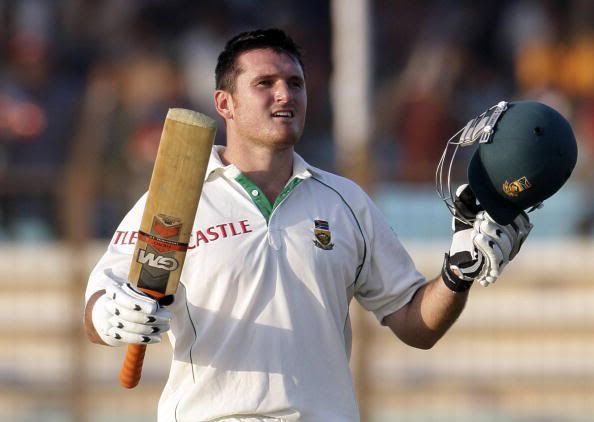

Saturday, July 5, 2008
Free cricket website link exchange!
Hey everyone!
Just would like to let you all know if you have a cricket blogsite that you would want to do a free link exchange with me feel free to comment on this post with the details of your cricket site and subject to you adding my site link on yours I will add yours A.S.A.P, usually within 24 to 48 hours.
Am approaching 5000 visitors now and looking at my stats I see people visiting my blogroll regularly, so your site will get visitors via mine :)
Many thanks to everyone that is already on my blogroll and that have added my site on theirs, I greatly appreciate it! If your site isn't on the blogroll, nows good....
Wednesday, July 2, 2008
ESPN Legends of Cricket
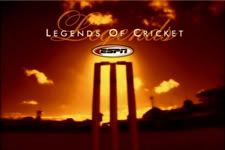
ESPN commemorated the start of the 3rd Millennium by forming an eminent panel to arrive at the list of Top 25 Legends of Cricket. The list was finalized in August 2001 and named as the ESPN Legends of Cricket.
TOP 10:
Players of the 1970s & 1980s are the most heavily represented, with Vivian Richards, Sunil Gavaskar, Dennis Lillee, Imran Khan.
Number 1: Sir Donald Bradman
Number 2: Sir Garfield Sobers
Number 3: Sir Vivian Richards
Number 4: Shane Warne
Number 5: Sir Jack Hobbs
Number 6: Dennis Lillee
Number 7: Sachin Tendulkar
Number 8: Imran Khan
Number 9: Walter Hammond
Number 10: Sunil Gavaskar
11-25:
No. 11: Sir Ian Botham
No. 12: Sir Richard Hadlee
No. 13: Keith Miller
No. 14: WG Grace
No. 15: Graeme Pollock
No. 16: Malcolm Marshall
No. 17: Greg Chappell
No. 18: George Headley
No. 19: Sir Frank Worrell
No. 20: Sir Leonard Hutton
No. 21: Wasim Akram
No. 22: Kapil Dev
No. 23: Steve Waugh
No. 24: Barry Richards
No. 25: Allan Border
26 Through 50:
No. 26: Sydney Barnes
No. 27: Everton Weekes
No. 28: Wilfred Rhodes
No. 29: Herbert Sutcliffe
No. 30: Bill O'Reilly
No. 31: Courtney Walsh
No. 32: Mike Procter
No. 33: Fred Trueman
No. 34: Brian Lara
No. 35: Clyde Walcott
No. 36: Richie Benaud
No. 37: Joel Garner
No. 38: Andy Roberts
No. 39: Curtly Ambrose
No. 40: Michael Holding
No. 41: Glenn McGrath
No. 42: Jim Laker
No. 43: Clarrie Grimmett
No. 44: Javed Miandad
No. 45: Ray Lindwall
No. 46: Victor Trumper
No. 47: Alan Knott
No. 48: Allan Donald
No. 49: Alan Davidson
No. 50: Bishan Bedi
Tuesday, July 1, 2008
Player Profile(#27)...Tim Southee (New Zealand)
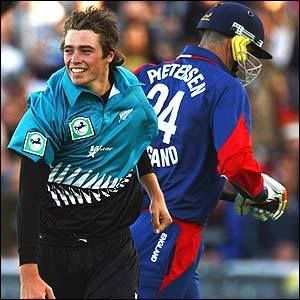
Timothy Grant Southee (born 11 December 1988 in Whangarei, New Zealand) is a New Zealand cricketer. He is a right-arm fast-medium bowler who plays international cricket for New Zealand and State Championship cricket for Northern Districts and plays for Northland in the Hawke Cup. He made his first-class debut on 19 February 2007 at the age of eighteen.
After an impressive start to his career with Northern Districts, Southee was picked to play for a New Zealand side in a Twenty20 match against a Bangladesh side on December 23, 2007. The game was a charity match for cyclone relief in Bangladesh.
On 30 January 2008, Southee was named in the New Zealand squad for two Twenty20 International games and three One Day International games against England. New Zealand Cricket Selection Manager, Sir Richard Hadlee said:
"Why delay producing a player of some talent? Perhaps I could compare him with Brendon McCullum when he started (in 2002) - he had a lot of potential. It might take a lot of time for Tim to find his feet but why wait two or three years when someone is in a special category? The feed back we're getting is that this guy has got it. "He runs in relatively straight, he gets through his action nicely and he moves the ball, particularly away from the batsman."
He made his official international debut on 5 February 2008 in the first Twenty20 match. In the second match, Southee was New Zealand's best bowler with figures of 2/22 from four overs.
Southee then traveled to Malaysia to play in the 2008 Under-19 Cricket World Cup, where he finished as Player-of-the-Tournament after taking 17 wickets at 6.64 with an economy rate of 2.52 runs per over.
After an injury ruled Kyle Mills out of the third Test match of England's tour, Southee was picked to make his Test match debut on 22 March 2008 at Napier. He had an immediate impact in the first day's play, dismissing Michael Vaughan and Andrew Strauss in his second and third overs, and then later claiming the wicket of Kevin Pietersen. On the second day's play he took the two wickets needed to complete a debut five-wicket haul, finishing with 5-55. During New Zealand's second innings against England, whilst chasing an improbable target of 553, Southee launched an attack on the England bowlers hitting nine sixes and four fours, with his debut fifty coming off twenty-nine balls. The fifty was the fastest in New Zealand test history, replacing Ian Smith's previous record of thirty four balls. He eventually finished on 77* from 40 balls. Only four other test cricketers have hit more sixes in an innings, Wally Hammond, Nathan Astle, Matthew Hayden and Wasim Akram.
See more info on the talented Tim Southee by right clicking HERE
*Acknowledgements to Wikipedia org and others.
In the International Spotlight...Netherlands Cricket
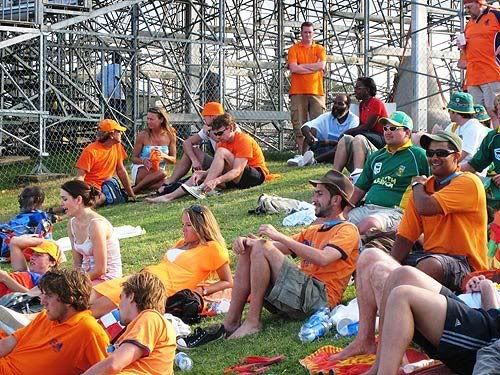
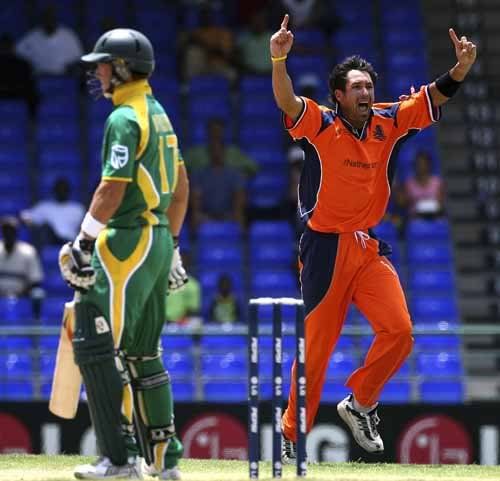
The Dutch cricket team is a national cricket team representing the Netherlands. It is administered by the Koninklijke Nederlandse Cricket Bond (Royal Dutch Cricket Association) which is based in Nieuwegein in the centre of the country and is older than many renowned cricket clubs in the West Indies, Australia, and New Zealand.
Cricket has been played in the Netherlands since at least the 19th century, and in the 1860s was considered a major sport in the country. Many other sports (notably football) have long since surpassed cricket in popularity amongst the Dutch, and today there are around 6,000 cricketers in the Netherlands, making it the 25th most popular sport. The first national association, the forerunner of today's Royal Dutch Cricket Association, was formed in 1883 and the Netherlands achieved Associate Membership of the ICC in 1966.
The Dutch team has taken part in all eight ICC Trophy tournaments, winning the competition in Canada in 2001 and finishing as runners-up twice (in 1986 and 1990). The Netherlands have also participated in the 1996, 2003 and 2007 Cricket World Cups, and from 1996 onwards entered the English domestic NatWest Trophy competition (and its successor, the C&G Trophy). In 2004 they played first-class cricket as part of the ICC Intercontinental Cup, drawing with Scotland in Aberdeen and then going down to an innings defeat against Ireland in Deventer.
In 2005 the Dutch team beat the UAE to finish fifth in the ICC Trophy, a slightly disappointing result but one which meant that they qualified for the 2007 World Cup and would gain full One Day International status from 1 January 2006 until the 2009 ICC Trophy.
HISTORY:
19th century-
Cricket was introduced to the Netherlands by British soldiers during the Napoleonic Wars in the 19th Century and the Cape Colony in 1856. Further clubs came into existence in the 1870s. The Netherlands national team played their first game in 1881. They fielded 22 players against an Uxbridge Cricket Club XI, but still lost by an innings. The Dutch Cricket Union was formed in 1883, with 18 member clubs, four of which are still in existence today.
The first national tournament was held the following year, and was won by Haagsche CC. English touring teams then began visiting in 1886 including one in 1891 that featured Sherlock Holmes author, Sir Arthur Conan Doyle.
In 1894, the Gentlemen of Holland became the first Dutch team to visit England. The tour included a game against the MCC at Lord's, which the MCC won by an innings and 169 runs. Tours by English sides continued for the rest of the 1890s, which also saw the emergence of Carst Posthuma, who was to become the first Dutch player to play first class cricket. He was eventually to take 2339 wickets at an average of 8.66 in his career in the Netherlands.
1900s to 1910s-
1901 saw another visit to England by the Gentlemen of Holland. They played five games on the tour, drawing two and the losing the remainder. 1905 saw the first international game against Belgium, which finished in a draw.
In 1910, the Dutch team visited Belgium to take part in an exhibition tournament, which also featured the MCC, Belgium and France. They lost to the MCC by 2 wickets, and to France by 63 runs, but beat Belgium by 116 runs.
During World War I, in which the Netherlands remained neutral, large numbers of British officers were interned in the country, and many of these joined local cricket clubs. A team made up of these players even won the Dutch championship in 1918.
1920s to 1940s-
The Flamingo's, a Dutch touring side, was formed in 1921, they would go on to make several tours of England. Tours by English teams would continue in this period also. The 1930s are said to be the decade in which Dutch cricket thrived the most, with cricket curtailed somewhat after the German invasion in 1940, due to its association with the British military. In 1934, the first Dutch women's league was formed, and the women's national team played two games against Australia in 1937, losing heavily in both. Cricket was curtailed somewhat after the German invasion in 1940.
1950s to 1980s-
The 1950s saw visits to the Netherlands by Australia and the West Indies, in addition to the first match against Denmark. In 1958, the Cricket Board received a Royal charter, and became the "Koninklijke Nederlandse Cricket Bond", a name which it retains to this day.
1964 brought the Netherlands first victory against a Test-playing nation, with a 3 wicket win over the Australian team. They were rewarded with associate membership of the ICC two years later.
The first two ICC Trophy tournaments, in 1979 and 1982 brought little success to the Dutch, not progressing beyond the first round in both tournaments. But in the 1986 tournament, they finished as runners up to Zimbabwe. The same year, Paul-Jan Bakker became the first Dutch player to play county cricket. In 1989, the Dutch beat a strong England XI that featured two future England captains in Alec Stewart and Nasser Hussain by 3 runs.
1990s-
1990 would once again see the Dutch finish runners up to Zimbabwe in the ICC Trophy, a tournament they hosted. (The first outside England) Test nations would be beaten again in 1991, which saw a 5 wicket win over the West Indies, in 1993, which saw a 7 wicket win over England, and in 1994, which saw a 9 wicket win over South Africa. 1994 would also finally see the Dutch qualify for the World Cup, after finishing third in that year's ICC Trophy. In the World Cup itself in 1996, they didn't progress past the first round, but performed with some credit in their game against England.
1995 saw the Dutch enter the NatWest Trophy for the first time, and they would spend 10 years in the tournament, their best performance coming in 1999, when they progressed to the 4th round, beating Durham along the way. 1999 also saw a World Cup game come to the Netherlands, but sadly for them the Dutch were not involved, after a 6th place finish in the 1997 ICC Trophy.
The Netherlands competed in the first European Championship in 1996, coming second. They have competed in every tournament since, winning in 1998 and 2000.
2000s-
2001 finally saw the Netherlands win the ICC Trophy, beating Namibia in the final in Toronto. They thus qualified for the 2003 World Cup. They again failed to progress beyond the first round in the tournament, but recorded their first ODI win over Namibia during the tournament.
In the 2005 ICC Trophy, the Netherlands finished 5th, qualifying for the 2007 Cricket World Cup, and gaining one-day International status until the 2009 ICC World Cup Qualifier. Their first ODI with this new status was intended to be against Kenya in March 2006, however this match was cancelled due to a Kenyan tour of Bangladesh. Instead their first ODI with this status (and their twelfth overall) came against Sri Lanka in what was their first ODI at home. This ended in disappointment though as the Dutch conceded a record ODI score of 443/9. They lost the two match series 2-0.
The Dutch played their first Intercontinental cup game of 2006 against Kenya in Nairobi in March. The game finished in a draw, with the Netherlands gaining six points for having a first innings lead. In August, the Netherlands competed in Division One of the European Championship. They beat Denmark and Italy, but lost to Scotland and their game against Ireland was rained off. They finished third in the tournament.
In November, the Dutch travelled to South Africa. They first played an Intercontinental Cup match against Bermuda, with David Hemp scoring a then competition record of 247 not out in the drawn match. This was followed by a triangular series against Bermuda and Canada, which they won. Their final game of 2006, also in South Africa, was an Intercontinental Cup game against Canada. They won the match by 7 wickets, with Ryan ten Doeschate setting a new competition record individual score of 259 not out.
In early 2007, they travelled to Nairobi, Kenya to take part in Division one of the World Cricket League, finishing third in the six team total. This was followed by the 2007 World Cup in the West Indies, where they did not progress beyond the first round, though they did beat Scotland along the way.
Following the World Cup, they underwent a period of transformation. Captain Luuk van Troost retired, as did Tim de Leede and their coach Peter Cantrell. Daan van Bunge also opted to take a break from international cricket, and the new coach opted not to retain the services of bowling coach Ian Pont.
In June 2007, they visited Canada, first winning an Intercontinental Cup match against Canada in King City, Ontario. They then won the first ODI by 117 runs, with the second one being abandoned. They then played a quadrangular series in Ireland, losing by ten wickets to the West Indies, and by one run to Ireland, with the game against Scotland being abandoned due to rain.
FAMOUS PLAYERS:
Several Dutch cricketers have also played at first-class level elsewhere, the most successful of these probably being Roland Lefebvre who played for Somerset and Glamorgan in English county cricket as well as for Canterbury in New Zealand. The Essex all-rounder Ryan ten Doeschate and Worcestershire batsman Alexei Kervezee are the only current members of the Dutch team to be playing county cricket.
Other Dutch players to have played first class cricket outside of the Intercontinental Cup are:
A portal to Cricket in the Netherlands can be viewed by right clicking HERE















